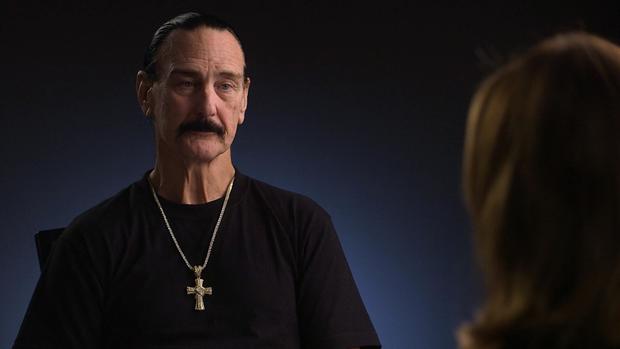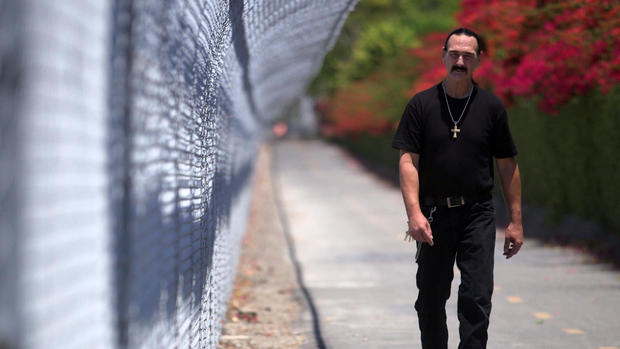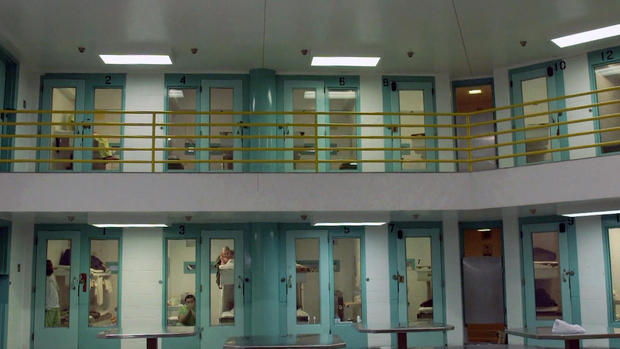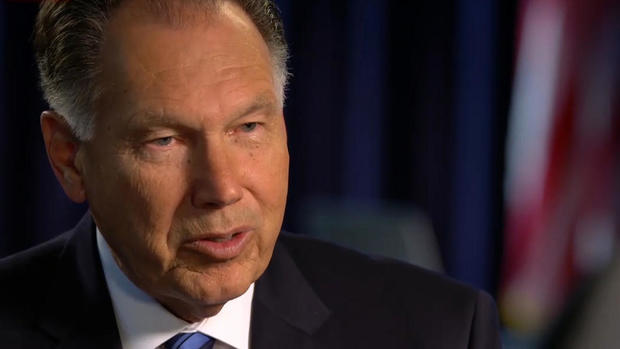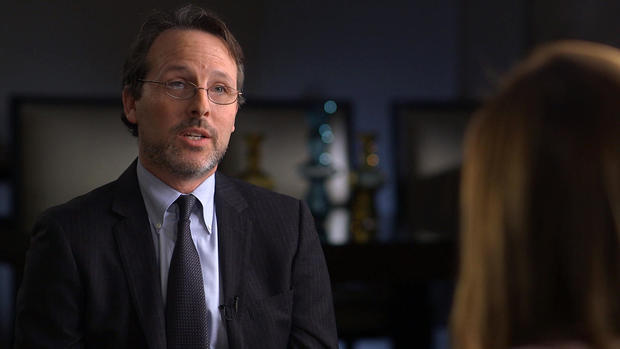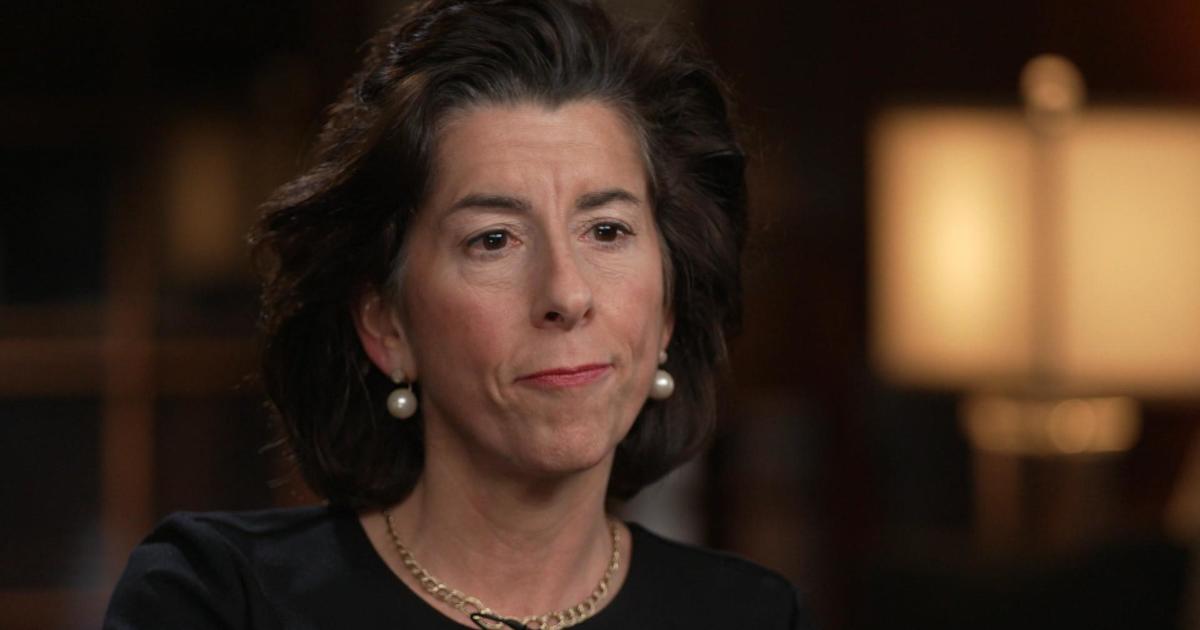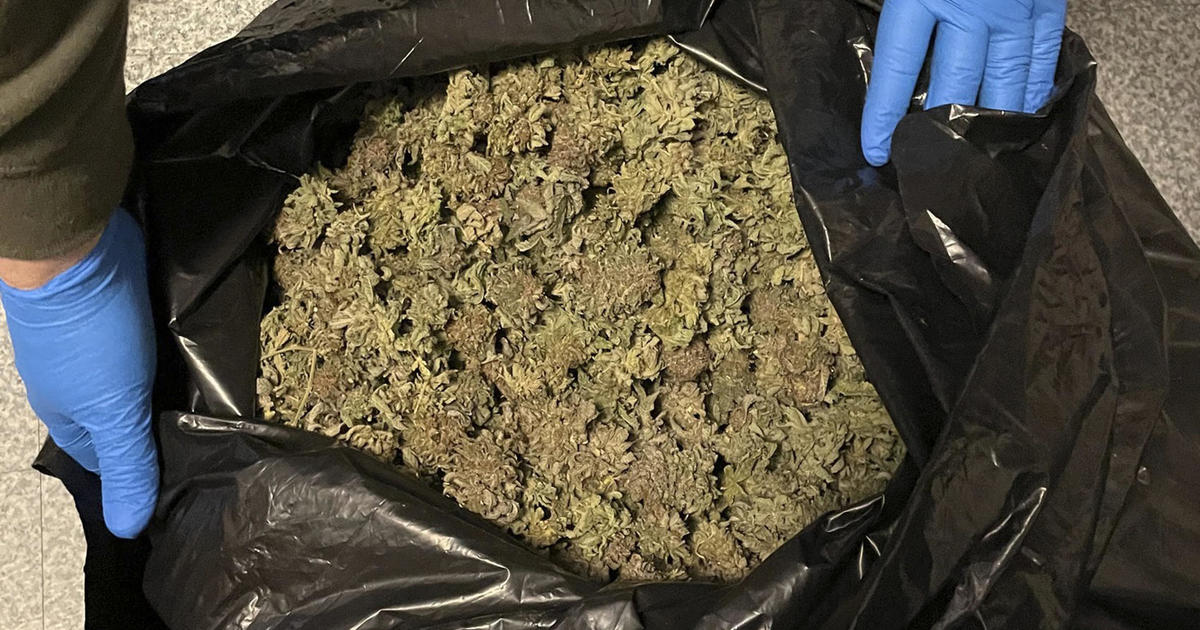Informant says he was planted in Orange County jail to snitch
- Jailhouse informant Mark Cleveland says deputies planted snitches near high-profile targets and guided them to fish for info that might help prosecutors' cases.
- Orange County DA Tony Rackauckas tells 60 Minutes the allegations are "simply not true." His office and the sheriff's department are under investigation.
Orange County, California—an hour south of Los Angeles—is best known for its wealthy, sprawling suburbs, tony beach communities and Disneyland.
But lately, it has drawn unwanted attention from the California attorney general and the U.S. Department of Justice for the way its prosecutors use informants in its jails.
Used correctly, informants can be valuable assets to law enforcement to help bolster their cases. Misused, their work can backfire, upsetting the scales of justice, reversing convictions, and freeing guilty criminals. That's what's happening in Orange County.
This is a story of two snitches. One who remains in jail. The other, is back on the streets. But now he's snitching on the prosecutors he once loyally served.
Sharyn Alfonsi: How many times have you been arrested?
Mark Cleveland: Numerous. Numerous, numerous.
Sharyn Alfonsi: Five, 10, 15?
Mark Cleveland: --over 100. Let's say over 100.
Mark Cleveland is a career criminal. A life of drug addiction etches his face and gave him a rap sheet nearly as textured. Forty years of petty crimes, burglaries…a hit and run.
Sharyn Alfonsi: How are you out?
Mark Cleveland: Because I am extremely good at providing information to the Sherriff's Department and the District Attorney's office and have been for years.
Cleveland was a jailhouse informant -- a snitch. He ratted on other inmates in exchange for time off his sentence.
Sharyn Alfonsi: You were able to knock how much off your sentence?
Mark Cleveland: Well…40 years…
Sharyn Alfonsi: Because you were such a good informant?
Mark Cleveland: Yeah.
We met Cleveland at a hotel. He keeps a low profile these days fearful that former jail mates may be seek retribution for betraying them. During his decades behind bars, Cleveland says he was willing to do almost anything law enforcement asked of him because he wanted out.
Mark Cleveland: The problem is the desperation to get out, and the willingness of the district attorney to use us. And unreliability-- the propensity for unreliability is huge. I mean, we want outta jail, willing to do anything. And you're—
Sharyn Alfonsi: And willing to say anything.
Mark Cleveland: And say anything, right.
Sharyn Alfonsi: Snitches will lie?
Mark Cleveland: Oh, snitches do lie every opportunity they-- if they need to, they will. It's about getting outta jail. What do I have to do to get outta jail?
Sharyn Alfonsi: That's the end game for everybody?
Mark Cleveland: Sure. Always has been.
Sharyn Alfonsi: -- did you, Mark Cleveland, ever lie about information that you got from another inmate?
Mark Cleveland: Give wrong information—
Sharyn Alfonsi: --give wrong information.
Mark Cleveland: --on another inmate? No, I'm sure that a lotta my information was probably-- maybe tainted.
Cleveland explains he was part of a sophisticated, secret network of informants, tightly organized and directed by law enforcement inside the Orange County jails. He says it worked like this: jail deputies would plant snitches like him near high-profile targets. Then, the deputies guided them to fish for information that might help bolster the prosecutors' cases.
Cleveland recalls one deputy asked him to target a member of the Mexican mafia, a notorious gang that rules much of the prison turf in California.
Mark Cleveland: He said "We want him on a murder. And if you could give us any information on that, I'll personally walk you out of the jails.
Sharyn Alfonsi: He told you he would walk you outta the jail?
Mark Cleveland: Yeah. And I said, "Well I'm not in there with him. He said we'll just move you and we'll put you right there with him.
Sharyn Alfonsi: For the most part, the people you were informing on, was it a coincidence that you heard what they said or were you placed there?
Mark Cleveland: I was placed there it's something they do. He indicated it was something they do regularly.
What Cleveland is describing is unconstitutional. The integrity of the justice system is based on everybody following the rules. If an inmate just happens to hear and pass on incriminating information to prosecutors…that's OK. But inmates cannot be planted and directed to gather information from someone who's already been charged with a crime. If they do that, they are illegally acting as agents of law enforcement, which is exactly how Mark Cleveland saw himself.
Mark Cleveland: What you see here in this briefcase. It's full of documents and copies of documents, and notes, and evidence of everything that I've done.
Cleveland showed us some of the meticulous handwritten copies of notes he sent to prosecutors. Hundreds of pages on dozens of cases and he said whenever he needed to, he could call the district attorney's office to report on his jail mates.
Sharyn Alfonsi: You had a direct line to the DA's office?
Mark Cleveland: I could get on the phone anytime I want night or day.
Sharyn Alfonsi: I thought you were limited on how many phone calls you can make?
Mark Cleveland: Oh, you are unless you're Mark Cleveland.
Sharyn Alfonsi: It sounds like you were working for the District Attorney's office.
Mark Cleveland: I was. I was working right there with Tony. I would call him up and he loved it. Every time I'd call him, "Oh, you know, this is great. We really appreciate it."
"Tony" is Tony Rackauckas, the Orange County district attorney.
Sharyn Alfonsi: Mark Cleveland. Do you know who he is? Does that ring a bell?
Tony Rackauckas: I do know who he is. I remember him having been an informant many years ago in a case or two, but my memory on that actually is not that clear.
Rackaukus is a former judge and a veteran prosecutor who has been re-elected four times as district attorney. He commands an office of 275 lawyers who handle 15,000 felony cases a year. His office is now under investigation by both state and federal authorities for the way it uses—and misuses—informants in county jails.
Sharyn Alfonsi: How should we take Mark Cleveland's statements that he made to us about all this?
Tony Rackauckas: I think you should assume you're talking to an informant. And if he's talking, he's probably lying.
Sharyn Alfonsi: But this idea that, you know, he was part of this informant program and that he could just pick up the phone whenever he wanted and call the district attorney's office, you're saying it's not true?
Tony Rackauckas: Fantasy. It's fantasy.
Sharyn Alfonsi: He told us that he was deliberately placed by deputies in the jail next to inmates to get information. Is that true?
Tony Rackauckas: No, it is not true.
Scott Sanders: They deny, deny, deny. They basically say, "We don't have an informant program. There's no organized informant program." This is just a conspiracy theory on the part of the defense.
Assistant public defender Scott Sanders first uncovered the existence of a secret jailhouse informant program in Orange County.
His suspicions peaked back in 2011 after one of the worst days in Orange County history.
"California highway patrol."
"We have some shootings here in Seal Beach."
On a sparkling October afternoon, 41-year-old Scott Evans Dekraai walked into a beauty salon and shot to death his ex-wife and seven others. Minutes later Dekraai was arrested and quickly admitted his crime.
DA Rackauckas called a press conference.
Rackauckas: "The only thing that might approach justice in a case like this is to seek the death penalty."
Sanders—an assistant public defender for decades--was appointed to represent accused killer Scott Dekraai, a tough job made even tougher when he learned his client had confessed to another inmate in the Orange County jail. Named only as "Inmate F." The prosecutors tried to keep the informant's true identity hidden, arguing they needed to protect him. After months, of relentless digging Sanders finally learned "Inmate F" was Fernando Perez, a well-documented, prolific snitch.
Scott Sanders: The representations they made, was that Fernando Perez was just a good citizen who was looking for nothing in return, didn't want anything, and was just basically doing this out of the goodness of his heart.
Sharyn Alfonsi: And you found he was a Mexican mafia gang leader, and had three strikes against him, and was desperate to reduce time off of his—
Scott Sanders: Right. And—
Sharyn Alfonsi: --sentence.
Scott Sanders: --he had already been-- he had been convicted. He was looking at a 25-to-life sentence. So he had all the incentive in the world to do every last thing he could do to gain favor with the prosecution.
Something Sanders had seen before. Another one of his clients, also accused of murder, also facing the death penalty, also just happened to confess to Fernando Perez.
Scott Sanders: I was stunned. I mean it was-- it was one of those moments where you kind of just look up and go, "What's going on here?" And that's really kind of the starting point. That realization is what propelled us forward.
In voluminous court documents, Sanders – a zealous opponent of the death penalty--accused the district attorney's office and sheriff's department of illegally planting Perez in the cell next to Dekraai, then trying to cover it up by hiding Perez' long resume as an informant.
Sharyn Alfonsi: Was Fernando Perez deliberately placed next to Dekraai in a jail cell?
Tony Rackauckas: Fernando Perez was not deliberately placed next to Dekraai in the Orange County Jail. Dekraai was put there on a nurse's order and Fernando Perez had already been there.
Sharyn Alfonsi: It seems from the outside like a hell of a coincidence, that this guy who's a well known and valuable informant is placed next to this high-profiled target. But you're saying it was just that, it was just a coincidence?
Tony Rackauckas: It was just a coincidence.
Scott Sanders says an amazing coincidence in a jail with 6,000 inmates. DA Rackauckas insisted there was no jailhouse informant program.
When Mark Cleveland heard that, he called assistant public defender Scott Sanders and went back to his old job of snitching. But this time, he began informing on the prosecutors he once served.
Sharyn Alfonsi: What did he tell you about how the jailhouse informant program works?
Scott Sanders: He said we were onto something really bad. And then he started to describe things in details. And the details made sense.
Sharyn Alfonsi: What did he tell you that was-- that you didn't know?
Scott Sanders: We were really looking at a relatively small time period. And here comes Mark Cleveland and says, "No, no. It's been going on for years. Let me take you back to the cases."
Tony Rackauckas: It's simply not the case. That's just not who we are. We prosecute cases in, you know, in a fair and ethical manner.
Sharyn Alfonsi: How often does your office use jail house informants?"
Tony Rackauckas: --- not very often. Informants are not the most reliable people around. They are in fact unreliable and everybody knows that.
Which is why Cleveland says he, and many other inmates gathering information, were rarely called to testify.
Sharyn Alfonsi: So, if you weren't testifying what were they doing with all the information?
Mark Cleveland: They were getting plea bargains on 'em. Rather than have-- put me on the stand.
Sharyn Alfonsi: They didn't want to put you on the stand?
Mark Cleveland: No, they didn't want to put me on the stand. They don't want to put any informant on the stand.
Tony Rackauckas argued his prosecutors never intended to put Fernando Perez on the stand either. But they did want to hear what Scott Dekraai told Perez about the murders. Prosecutors worried Dekraai might plea insanity to avoid the death penalty. So they placed a bug in Dekraai's cell and started recording as Perez pumped him for details.
Tony Rackauckas: -- it's not a bad thing to get evidence that would tend to rebut an insanity defense so that a jury could hear him describing the murders and why he did it and what he did.
But the judge threw out the confession. He said Perez was acting as an agent of law enforcement when he egged on Dekraai to tell him about the killings. A failed ploy that has delayed justice for the families of Scott Dekraai's victims for years in what should have been a slam-dunk case.
Sharyn Alfonsi: You had a great case with Dekraai. You had confessions, you had witnesses, you had motive. Why risk it and use somebody like Fernando Perez as part of your case?
Tony Rackauckas: Well, look, we had a really good case, no question about it. When you listen to what it was that he had to say to Perez, it was a very clear statement of his-- of-- of what it was he was doing. His intent, his malice, his reasons.
Under mounting public and political pressure, the district attorney appointed a Blue Ribbon panel to look into what happened.
Sharyn Alfonsi: They described the office as a "must-win mentality," they described your office as a "ship without a rudder." They said, "There's been a failure of leadership."
Tony Rackauckas: You know, it's interesting they did say those things and they put that in the writing. And-- but I talked to them personally and they really didn't have that to say personally.
Tony Rackauckas: It's getting around that there's some kind of a conspiracy or there's some kind of-- or there's some kind of willingness to violate people's rights or to not give people a fair trial, that's a false narrative. That's just-- that's simply not true.
Sharyn Alfonsi: OK, so clarify it for me.
Tony Rackauckas: So the public defender made a lot of allegations, of all kinds of criminal conduct, of terrible things. And believe me-- and if those things were true-- we should be in jail, frankly; if those things were true, that would be very bad.
Sharyn Alfonsi: But what about the allegation that the office withheld evidence?
Tony Rackauckas: The office did not withhold evidence; we have not withheld any evidence.
He told us that even after the judge disagreed. The judge ruled jail deputies—working for the DA's office-- "intentionally lied or willfully withheld material evidence" about the secret informant program.
The judge went on to say that even if the prosecutors didn't know deputies were hiding evidence, they should have. And then the judge went even further...convinced Dekraai could not get a fair trial from Orange County prosecutors he kicked the entire office, all 275 of them, his entire office, off the case.
Dekraai still hasn't been sentenced and the informant debacle has led to a half-dozen cases unraveling, putting murderers and thugs back on the street.
As for Fernando Perez…Inmate F...his snitching paid off. Instead of life in prison, a judge sentenced him to spend another few years in protective custody and he'll be released as a reward for all his snitching.
The U.S. Department of Justice, the California attorney general and a local grand jury are all now investigating both the DA's office and the sheriff's department.
